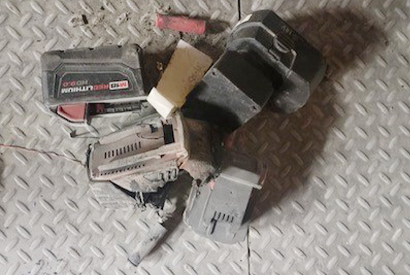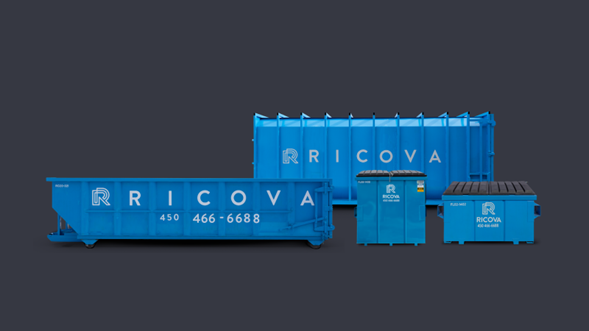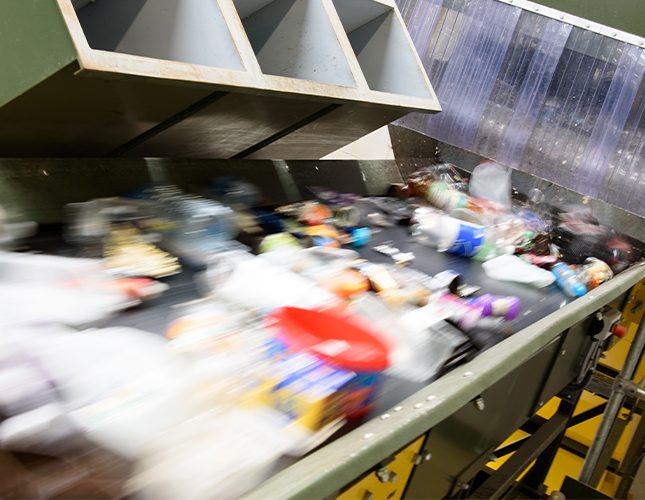The sorting center is burning, will action be taken?
The fires at the sorting centres have attracted a great deal of attention in recent weeks, particularly that of a building, renovation and demolition (CRD) sorting centre in eastern Montreal, which has impacted the lives of the residents of the neighbourhood. Yet, a year ago, Ricova was already alerting municipalities and the government with its report Les piles au lithium dans le bac bleu, un mélange incendiaire!
Why are we talking so much about fires involving recyclable materials, waste materials or CRD materials, but nothing seems to be changing?
Significant risks to the health and safety of all
In the case of fires in sorting centres, surrounding residents suffer from effects such as smoke, the presence of emergency vehicles of first responders in their neighbourhoods and the risks to their property. Even worse, these accidents put the health, safety and even the lives of workers at serious risk.
In almost all cases of fire, it is materials that should not have gone to the sorting centre that ignite the other materials.
Ten years ago, if you saw a fire in a sorting centre once or twice a year, the incidence of that fire went up to four times, four to eight times a year.
It doesn’t go in the bin… where does it go?
Dangerous goods don’t fit in the bin. Even if they are sometimes made of a material that is recyclable, these items should not be put in the blue bin:
- Lithium-ion batteries
- Tools, such as drills, saws, etc., whether electric or powered by fuel
- Containers and cans of chemicals, such as pool or spa care products
- Electronic devices such as cellular phones, televisions, calculators, computers, etc.
- Propane gaz cylinders
- Car pieces and batteries

Wireless tool destroyed by fire.
Sorting centres are responsible for managing recyclables, not hazardous materials. In addition to the eco-centres, which are equipped to store hazardous materials safely, several electronic waste recovery companies offer drop-off points everywhere. To find them or find out how to get rid of items that could potentially cause fires, damage to trucks or sorting equipment or even seriously injure a worker, see the application Ça va où? from Recyc-Québec.
Fires easily avoided… with good information
A fire, obviously, requires three elements: a fuel, a source of heat and oxygen (oxidizer). To start a combustion, the fuel must be exposed to a source of sufficient heat to reach its ignition temperature.
Today, 90% of fires in recycling sorting centres are caused by lithium-ion batteries, which are found in countless everyday objects, such as tools, small electronic devices with or without wires, and others.
When crushed by the machinery of sorting centres or collection trucks, these objects risk creating flames, overheating, even igniting.
Putting these objects in the blue bin means placing a potential source of heat directly in contact with a fuel, that is paper, cardboard, plastic, which you also put in the recycling bin.
Did you know?
Inaction has consequences
Because that’s where the problem lies. After Ricova brought together Quebec’s major recycling sorting centres in a major awareness-raising initiative, decision-makers did not take action.
Ricova and its partners have made available to their clients, the municipalities, a detailed report, solid recommendations and tools to reduce these risks to human life and damage to infrastructure. There are few cities that have taken action.
Almost a year ago and multiple small and big sorting centre fires later, it is appropriate to recall the recommendations issued by Quebec recycling sorting operators:
- Develop a large-scale outreach program by provincial and municipal authorities to reach the public directly.
- Install a sticker on all recovery bins, with a visible pictogram, to prohibit the deposit of hazardous materials, such as batteries, thereby helping to minimize a large number of rejections due to a lack of knowledge of the risk.
- Facilitate and make accessible the process of recycling hazardous materials for citizens from start to finish.
- Involve producers of hazardous materials in managing the risk their products create to the health and safety of the population and workers, especially in sorting centres. Encourage actions such as the adoption of a single symbol to be placed on containers prohibiting the deposit in the recycling of the product, financial participation in public awareness campaigns as well as in the collection and processing of their end-of-life products.
A renewed call to collaborate
Eliminating risk at the source is the simplest and most effective solution.
Unfortunately, this risk elimination is impossible to achieve by the sorting centres themselves, due to the speed and complexity of the operational processes.
These facilities require support from municipal and provincial organizations to minimize the impacts of these batteries thrown into the recovery bins through neglect and ignorance.
It is therefore urgent to take action to protect the health and safety of employees, as well as the facilities of the sorting centres in Quebec. The number of fires caused by lithium batteries will increase steadily if strict provincial measures are not adopted quickly.
Do not hesitate to contact us if you have any questions:








